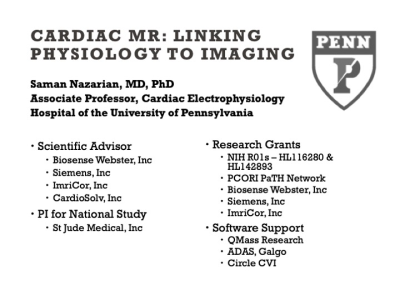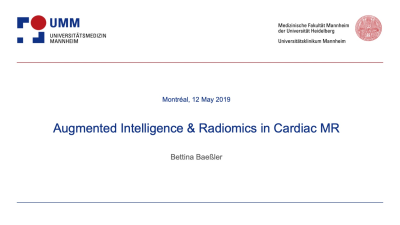Cardiac MR: Linking Physiology to Imaging
Cardiac MR: Linking Physiology to Imaging
Weekend Course
Weekend Course
ORGANIZERS: Tim Leiner, Bernd Wintersperger
Sunday, 12 May 2019
| Room 518A-C | 13:30 - 16:30 | Moderators: Andrew Scott, Byoung Wook Choi |
Skill Level: Basic
Session Number: WE-23
Overview
This course will review essentials for clinical cardiac MR exams and provide an overview of the background physiology, clinical needs, and technical foundations, and will also explore research promises of new insights into the heart and its tissues.
Target Audience
Attendees who have an emerging interest and want to develop a working knowledge of cardiac MRI, gain an in-depth perspective on the technical foundations, in order to improve clinical diagnostics or advance technical aspects and cardiac imaging.
Educational Objectives
As a result of attending this course, participants should be able to:
- Describe basic cardiac physiology and electrophysiology aspects as they relate to cardiac MRI;
- Recognize appropriate clinical indications for ischemic and non-ischemic cardiomyopathies; and
- Explain the benefits and challenges of new cardiac MRI imaging avenues.
Overview
This course will review essentials for clinical cardiac MR exams and provide an overview of the background physiology, clinical needs, and technical foundations, and will also explore research promises of new insights into the heart and its tissues.
Target Audience
Attendees who have an emerging interest and want to develop a working knowledge of cardiac MRI, gain an in-depth perspective on the technical foundations, in order to improve clinical diagnostics or advance technical aspects and cardiac imaging.
Educational Objectives
As a result of attending this course, participants should be able to:
- Describe basic cardiac physiology and electrophysiology aspects as they relate to cardiac MRI;
- Recognize appropriate clinical indications for ischemic and non-ischemic cardiomyopathies; and
- Explain the benefits and challenges of new cardiac MRI imaging avenues.
| 13:30 |
 |
Cardiac Physiology & Electrophysiology: Beginners' Guide
Saman Nazarian
Summary slide set for Dr. Nazarian's talk on: "CARDIAC MR: LINKING PHYSIOLOGY TO IMAGING".
|
| 13:55 |
Cardiac & Myocardial Function
Ru San Tan
Cardiac MR images contain rich 4-D spatio-temporal information that have been largely unexploited in routine image interpretation. Feature-tracking as well as other novel post-acquisition analyses of these images have potential to yield clinical meaningful readouts that can allow detailed dissection of heart chamber global and regional, systolic and diastolic, function.
|
|
| 14:20 |
Imaging of Myocardial Perfusion & Scar
Kate Hanneman
Imaging of Myocardial Perfusion & Scar
|
|
| 14:45 |
Break & Meet the Teachers | |
| 15:15 |
Advanced Contrast Mechanisms: Diffusion & DTI of the Heart
Christopher Nguyen
Diffusion MRI is powerful tool to interrogate the myocardial microstructure revealing fiber architecture. Technical advances in the past 5 years have enabled in vivo free breathing diffusion MRI of the heart and is primed to make new discoveries in patient populations as an orthogonal quantitative tool alongside conventional methods such as relaxometry mapping and function.
|
|
| 15:35 |
Self Assessment Module (SAM) | |
| 15:40 |
 |
Augmented Intelligence & Radiomics in Cardiac MRI
Bettina Baessler
Augmented intelligence and radiomics will play an important role in future cardiac MR. Techniques like machine learning or deep learning will influence all aspects of cardiac MR, from patient management and workflow over image acquisition and reconstruction up to image analysis and prognostic assessment. This presentation will focus on current applications of AI and radiomics in cardiac MR and address the limitations of these techniques before their integration into routine clinical practice becomes reality.
|
| 16:05 |
Benefits & Challenges of Cardiac Relaxometry
Donnie Cameron
Cardiac relaxometry permits quantitative characterisation of myocardial tissue. Over the past fifteen years, it has grown from obscure research method to routine clinical tool, offering strong diagnostic and prognostic utility in some conditions. The goals of this session are to: (i) outline the key benefits of cardiac relaxometry methods with respect to clinical applications; (ii) describe the methodological details of cardiac relaxometry techniques, including T1, T2, T2*, and T1-rho mapping; and (iii) summarise current pitfalls of relaxometry methods in terms of acquisition, processing, and interpretation.
|
|
| 16:30 |
Adjournment & Meet the Teachers |
 Back to Program-at-a-Glance |
Back to Program-at-a-Glance |  Back to Top
Back to Top